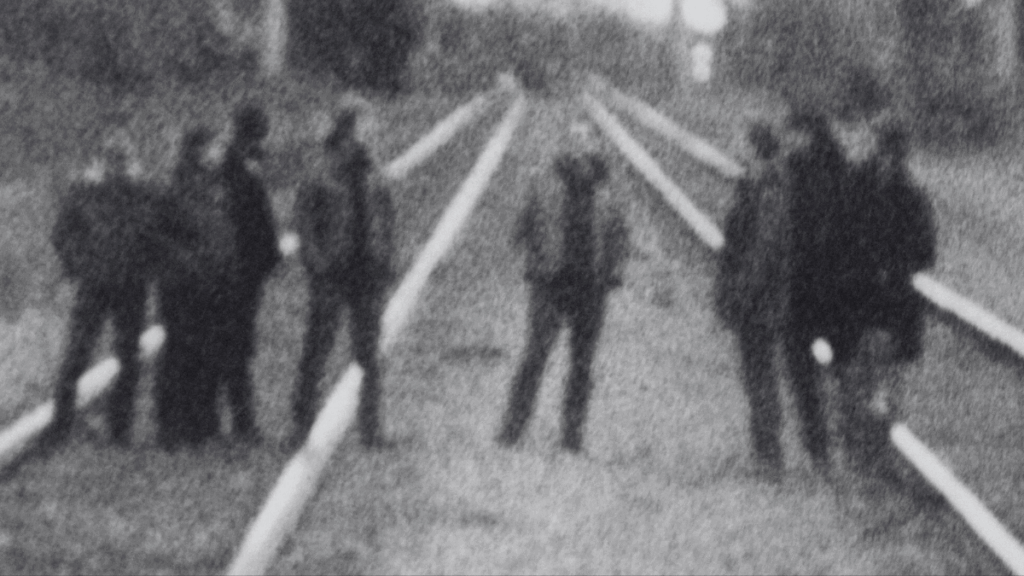Can The Dead Flag Blues ever be a kid’s song? I didn’t know English very well the first time I heard it, so the lyrics didn’t sink in except for two lines: “We’re trapped in the belly of this horrible machine, and the machine is bleeding to death,” and “I open up my wallet, and it’s full of blood.” At the time, I was also unsure how to read into the sounds of music and was craving something I could only describe as “sad music.” Only later did I come to understand that I craved music with a predominance of minor chords in opposition to those with major chords. How could people say Fake Plastic Trees by Radiohead was sad? It sounded so gleefully joyous with its resolve locked into an A chord.
The Dead Flag Blues was the first song I ever heard by Godspeed You! Black Emperor. As if a symptom of another time, which now feels like a parallel universe, I found out about this music in an unusual way, through a new internet service called Google, fresh into people’s Internet Explorer browsers, pre-installed in their grey-white Pentium 2 computers in the early two-thousands. This trendy new website had a short-lived tool that changed my life forever: a directory service. You could explore what then felt like the totality of this internet thing through subjects. And in the subject “Music,” there was the subthread “Genre,” in which there was the subthread “Experimental.” The official page of Godspeed You! Black Emperor was the first entry on the list of no more than ten links in the experimental music directory of Google, and it feels remarkably close today to what I remember seeing more than twenty years ago. I remember the band Negativland’s page was also there, but I didn’t engage with their music as much then. Oh, and also AMM.
I listened to Godspeed You! Black Emperor during what was perhaps the only truly depressed period in my life. I don’t mean this as a brag but to put into context how this music has ingrained itself into my psyche, where did it find me. I was a young, skinny South American kid with a voracious appetite for deep emotions. I was feeling desperately depressed in the clueless and clumsy ways other Brazilian kids like me were, being told to swallow down my grief, to decide away my feelings, to look the other way. I felt hopeless. The word that popped up in the front page title of GY!BE’s official website was “bleak,” a word I hadn’t heard before. I had to look it up in a dictionary, though, and I was soothed to find out such a word existed and how appropriately its sound fit into its description.
I didn’t particularly like The Dead Flag Blues, although the song’s length immediately sparked my interest. Until then, I thought the longest song in the world was “Shine On You Crazy Diamond” by Pink Floyd, hitting the 17:32 minute mark in the Echoes: The Best of Pink Floyd version. And here I was, almost by chance, stumbling upon a band in which every song was close to this length, some even longer.
I have a remarkably vivid memory of listening to Lift Your Skinny Fists like Antennas to Heaven (which, for the longest time, I thought was called Lift Your Skinny Fists like Athenas to Heaven) in full in my room with lights out, staring at the Windows Media Player sound visualizer patterns, completely mesmerized by the sonic intensity of that album. It left an undeniable mark on me and my musical sensibilities.
The Dead Flag Blues, however, stroke a different chord when compared with the rest of GY!BE repertoire. It inhabited an incongruous space in my emotional geography, and I never managed to put my finger on it exactly. To an extent, the music of GY!BE became so enmeshed with these early years that listening to it today feels like I am reaching for a shrinking version of myself, ever eluding, escaping me at each attempt to grasp. But The Dead Flag Blues doesn’t feel like that. It doesn’t spark the same wistfulness. It remained fresh.
I think The Dead Flag Blues is the greatest of the kids’ songs. It is caustically tender, candidly defiant. It shoots sentences such as “the government is corrupt,” “a dark wind blows,” and “it is the valley of death.” It oozes a dark naivité, which I can only surrender to and helplessly delight myself into. When the last two minutes hit, it reveals itself as a genuine lullaby in an insomniac world, a cooling song for the babies that keep my soul awake at night, crying their lungs out, hungry, bitter, distraught.

